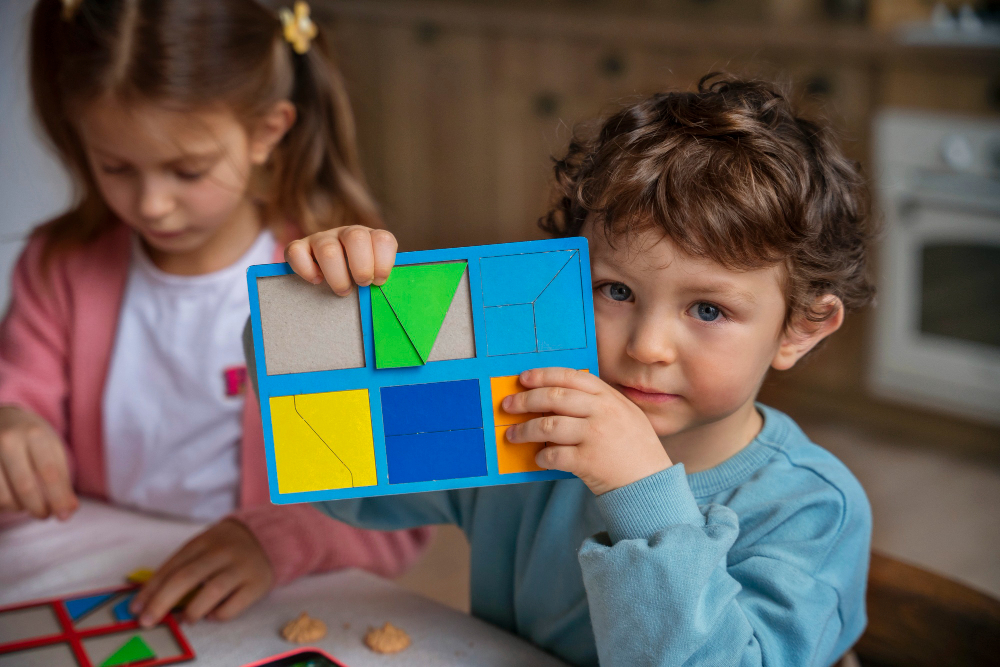
Play can be a great way to learn – as long as it doesn't involve investing in a new tablet or an interactive robot with ten buttons and instructions longer than a bedtime story. The priority is child development – through laughter, movement, discovery, and action. Want to find out which educational games are best for children? We've prepared a ranking just for you, packed with inspiring suggestions.
The best educational games for children - a ranking that will be useful when planning family activities
The weather forecast for the weekend is clear. Children have already become bored with most of their toys, and you want to find something that will keep them occupied for longer and be a helpful learning tool? Check out our ranking of educational games, where we suggest what's worth considering.
1. Memory games – practice your memory and concentration together
It's a game where there are no losers – what counts is how well or poorly you concentrate on a given day. Choose beautifully illustrated games featuring animals, plants, or everyday objects that can help develop memory and categorize. For a toddler, it's a great concentration exercise, and for parents, it's an excuse to have fun together without screens .
2. Educational cards with questions – quizzes that support child development
Simple cards with questions like "What animal is this?", "Which color is red?", or "What goes together?" are a great starting point for play. It's worth considering thematic sets related to a specific field or area of knowledge (processes occurring in the human body, countries and cities, the world of plants and animals – of course, adapted to the age of the youngest). These types of games stimulate thinking and develop vocabulary, and their additional advantage is their small size, so you can easily take them with you, for example, to a picnic in the park.

3. Wooden puzzles – training in logical thinking
Games based on matching shapes, colors, and patterns are a hit with children aged 2 and over. They develop coordination and observation skills, but also teach patience. Sorters and puzzles of this type are one of the first exercises in logical thinking for toddlers, and you can be their teacher.

Universal educational games based on your creativity
Not everything educational needs to be a board game! We've got a few suggestions for games that develop imagination and cognitive skills – and all you need is a minimum of materials and a maximum of imagination.
1. A story in three words
The rules are simple: an adult or child chooses three words (e.g., "sun, cucumber, rocket"), and the other person must create a short story that incorporates all of these elements. This game has many benefits: it develops cause-and-effect thinking, stimulates creativity, and helps build self-confidence.
2. Homemade Charades
No app or projector needed – just cards with slogans and a willingness to play. Charades develop spatial imagination, teach children to form associations, expand their knowledge of the world around them, and help children overcome shyness.
3. "What if..."
A brainstorming-style word game. Children come up with questions like "What if dogs could talk?" and adults (or other children) must answer. Guaranteed laughter and learning all rolled into one – the game helps develop creative thinking, language, and a sense of humor.
4. Home laboratory
No test tubes needed – just vinegar, baking soda, food coloring, and a bit of childish curiosity. Mix-and-match games teach children new principles, foster understanding of physical phenomena, and spark a fascination with the world.
If you're lacking inspiration for creative ways to spend time with your child, check out the lessons at Endo Drawing School . Illustrations designed by our artists, along with simple and accessible instructions, will surely help you learn new skills!
Why is it worth playing educational games with your child?
First, you build a bond. Second, you teach your child something important, but without being didactic. Third, you show them that learning doesn't have to be boring.
Educational games support:
- development of speech and cause-and-effect thinking,
- concentration and memory,
- fine motor skills and eye-hand coordination,
- creativity and cognitive flexibility.
An added bonus? They can be tailored to the child's age, interests, and abilities. Most importantly, they bring the joy and satisfaction of discovery.
Not sure how to choose an educational game? Keep these 3 most important factors in mind.
- Pay attention to the age of your child – some games will be too difficult or too boring.
- Don't be afraid of simplicity - memory, puzzles or card games can be more engaging than expensive electronic games.
- Observe your child's reactions – if they come back to the game on their own and want to try again, it's a sign that you've hit the mark perfectly.
The best educational games for kids – those that encourage thinking, take initiative, and are a lot of fun.





Podziel się:
What to take on holiday with a child [list]?
Preschooler's layette - a list of essential items